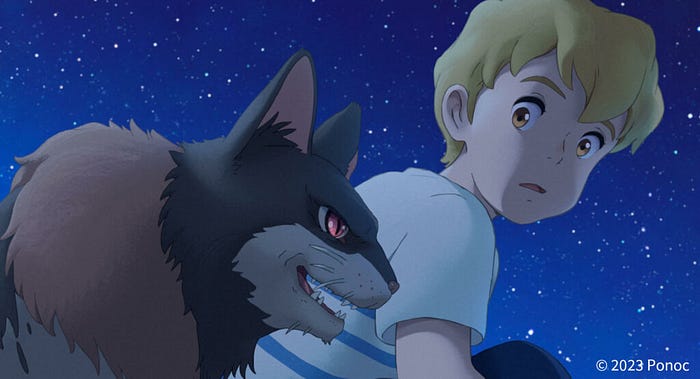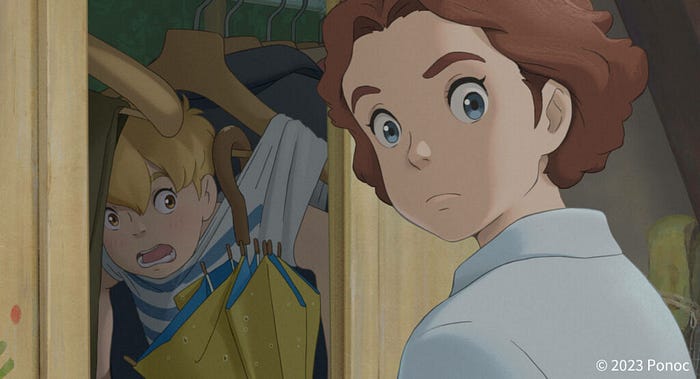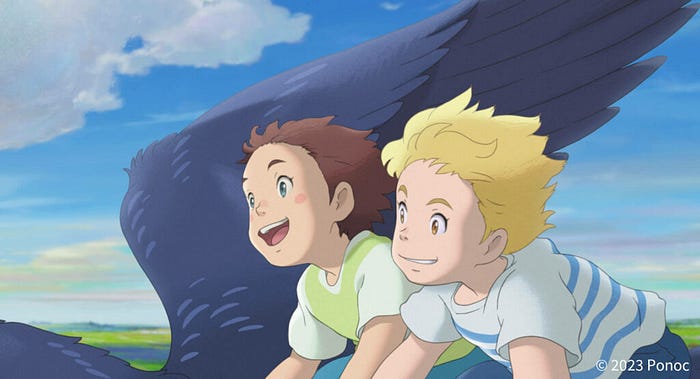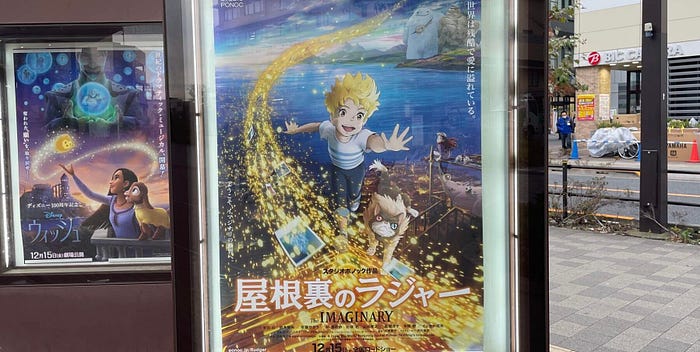In 2014, Japanese animation titan Studio Ghibli shut down its production team. Within a year, some of the studio's bigger names had regrouped, and a successor animation team came into being: Studio Ponoc.
Taking the Serbo-Croatian world for "midnight" as their moniker, Ponoc strove to fill the gap left behind by the shutter of the studio that directors Miyazaki and Takahata built. In 2017, they released their first feature film, the Ghibli-reminiscent Mary and the Witch's Flower. A mild box office and critical success, it would also be Ponoc's only full-length film for six years.
That is, until today, and the release of Momose Yoshiyuki's The Imaginary.
It's an ambiguous time to be a Ghibli successor; after all, Ghibli isn't shuttered anymore. The Studio returned in 2020 with the much-reviled CG-animated TV film Earwig and the Witch. (There happens to be a witchy through-line at both studios, starting with 1989's Kiki's Delivery Service.) More importantly, Ghibli just released its first theatrical film in a decade, and by globally beloved director Miyazaki Hayao, no less. With The Boy and Heron having just become the first-ever original anime film to top the US box office, Ponoc's return isn't getting the attention it might otherwise. But The Imaginary is still worth taking notice of.
Based on the British children's novel of the same name by A. F. Harrold, The Imaginary boasts the wonderful 2D animation one would expect from a team with Ponoc's pedigree. It's a fairly strong example of an anime film aimed at children, but which doesn't talk down to them. In fact, despite its fanciful nature, this is a surprisingly dark, occasionally eerie movie. Like The Neverending Story or Return to Oz, here, the whimsical and the frightening live side by side.

Just Imagine It
In Japanese, The Imaginary is called "Rudger in the Attic" (「屋根裏のラジャー」). The titular Rudger happens to be the imaginary friend of a young girl named Amanda. He loves spending all day with his "human friend," going on grand adventures via the power of her imagination (stunningly brought to life by the Ponoc animation team). Amanda is dealing with the loss of her father, and Rugder helps her cope — somewhat to the consternation of her mother, Lizzie, to whom Rudger is a mere invisible figment. (Lizzie is voiced by Ando Sakura, in a third starring role out of the past four movies I've reviewed here. Not complaining — she's pretty great.)
But their everyday life is turned upside down upon the arrival of the eerie Mr. Bunting, a Haiwaan shirt-bedecked older man who somehow still has an imaginary friend of his own — a ghostly, dead-eyed girl. When Rudger is forced to flee from Mr. Bunting, he discovers an imaginary world beyond the confines of the attic he once called his home.
This may all sound a bit like a feature-length treatise on the discarded imaginary friend Bing Bong from Pixar's Inside Out (2015). While The Imaginary lacks the emotional heft of that film, it does present an engrossing imaginary world. It also presents a real sense of danger. Mr. Bunting is a formidable, creepy villain (although perhaps sometimes creepy in more ways than intended). And his imaginary companion, like a cross between Sadako from The Ring and a character from Coraline, is probably the single creepiest visual in the Ghibli-Ponoc canon; she's likely to give kids nightmares.
The thing is, kids actually like the occasional fright in their media. That The Imaginary is willing to scare its audience is to its advantage.
A Somber Wonderland
The film also departs from more saccharine children's entertainment by being surprisingly somber. Sure, there are wonderous flights of fancy, magical worlds, and enough cartoony imagined characters to fill up Rodger Rabbit's Toontown. But in between the moments of fun and levity is the constant threat of loss. Sometimes, this is the worry of being forgotten by those you love; other times, it's the very real pathos of a child losing a parent. The film mixes the metaphorical anxieties of imaginary friends, bound for the dustbin of childhood memories, with more direct human tragedy.
Director Momose allows the film to take its time. Clocking in at nearly two hours, The Imaginary is perhaps even a little too leisurely for its own good. But it's this willingness to take the characters' emotions seriously, and inject real stakes, that lifts The Imaginary out of the realm of mere "good enough for kids" family entertainment.

Momose in the Director's Chair
Momose Yoshiyuki was an old hand at Ghibli, first joining their animation team in 1988 for an even darker film, Grave of the Fireflies. He showed a real knack for using animation to poignantly portray familial struggles in the short film "Life Ain't Gonna Lose", part of Ponoc's Modest Heroes anthology from 2018. That same sense of how children and parents relate to each other is brought to bear in The Imaginary.
Momose also accomplishes something important; making the film feel more "Ponoc" than "Ghibli." While still clearly deriving from the old house style (especially in the beautifully rendered everyday scenery of much of the background art), there's a specific shading style employed here that sets the movie apart. Mary and the Witch's Flower, while beautifully animated, felt a bit too "Ghibli lite." This movie manages to have its cake and eat it too, bringing Ghibli to mind while still being its own thing.
That's a good thing, since, while this is a stronger outing than Mary, it doesn't quite have that elusive Ghibli magic. It's hard to explain why; it might be that the world doesn't have that same lived-in feeling. Having most of the main characters be imaginary also produces a disconnect that's a bit hard to overcome.
But taken separately from the "Ghibli Successor" narrative, The Imaginary is still a good children's film. It doesn't pull its punches, and provides a sense of dreaminess and menace that children will enjoy.
The tagline on the film's poster reads 「世界は残酷で愛に溢れている。」"The world is cruel, and overflowing with love." That pretty much sums up the feeling you'll come away with after watching The Imaginary.
Here's hoping we get the next Ponoc film a bit quicker this time; there's a lot of promise here.

Planning a trip to Japan? Let Unseen Japan Tours help you create a custom, guided tour experience uniquely suited to your interests!

